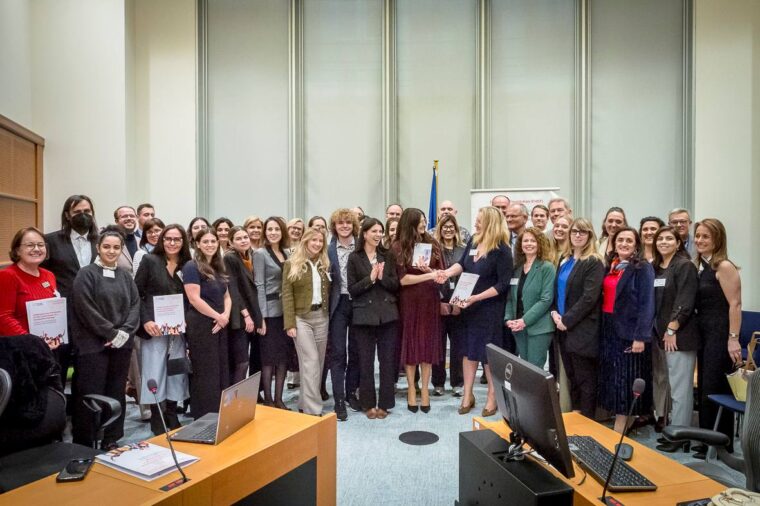
On 25 September 2025, the European Parliament in Brussels became the stage for a decisive moment in the fight against cardiovascular disease. The high-level meeting, “Cardiovascular Prevention as the Cornerstone of a Competitive Europe – Scaling Up Lipid Screening to Secure Next Generations,” organised by FH Europe Foundation, was co-hosted by MEP Romana Jerković, Chair of the MEP Cardiovascular Health Group and rapporteur for the forthcoming EU Cardiovascular Health Plan, together with MEP Tomislav Sokol, EPP, member of the SANT Committee on Public Health.
The event marked ten years since FH Europe first brought the voices of patients to the European Parliament. A decade later, those voices are helping to shape policy. What began in 2015 as a plea for recognition of inherited lipid disorders has grown into a central pillar of Europe’s strategy to prevent cardiovascular disease and protect future generations. The occasion also provided an important platform to officially present the Brussels International Declaration on Lp(a) Testing and Management.
From Patient Appeals to Political Momentum
The meeting opened with a short film from 2015, a poignant reminder of the first FH Europe meeting in the Parliament and the perseverance of families who demanded action. Watch a video from the first EU Parliament event in 2015 here.
In her remarks, MEP Romana Jerković underlined that cardiovascular prevention is an investment in the next generation and in Europe’s competitiveness and highlighted the need for systematic lipid screening to be part of the EU’s future approach to cardiovascular health.

Patients and Youth Ambassadors at the Heart of the Story
The most compelling voices in the room came from the youth ambassadors and caregivers who live with the consequences of late or missed diagnoses.
Lena-Rosa Hanauer from Austria, also representing her national orgnisatin FHchol Austria, Joanna Kacprzak from Poland, Aedan Kaal from the Netherlands and Teevi Poobus from Estonia shared deeply personal stories that revealed the cost of delayed detection and the difference that timely screening and treatment can make.
Their testimonies transformed statistics into lived experience, a reminder that policy decisions directly shape lives. Their intervention underscored an urgent truth: preventable losses of time, health and life can no longer be tolerated, and patients and caregivers must guide the shaping of cardiovascular strategies.

A Decade of Progress Driven by Patients
Magdalena Daccord, CEO of FH Europe Foundation, traced the journey from a grass-roots NGO to a respected international partner for health policy change. She highlighted milestones that turned advocacy into policy: the EU Best Practice recognition of FH paediatric screening, the Prague Declaration (2022) on screening children for FH, and the Brussels International Declaration (2025) on Lp(a) testing and management.
Her message was clear and determined: the next decade must be about implementation, turning knowledge and commitments into action to prevent the preventable.
Turning Political Recognition into Action
Kitti Almer, Policy and Advocacy Manager at FH Europe Foundation and the former Health Attaché and Chair of the Public Health Working Party under the Hungarian Council Presidency, pointed to a decisive step forward: the Council Conclusions on Cardiovascular Health adopted in December 2024 , which for the first time identified FH and elevated Lp(a) as EU-wide priorities for early detection and prevention. She stressed that this progress now needs to be translated into national-level action plans under the forthcoming European Cardiovascular Health Plan. Learn more about the council conclusions here
MEP Tomislav Sokol highlighted the European Parliament’s duty to ensure that the political momentum of recent years results in binding commitments, funding and equitable implementation across all Member States. He framed prevention as both a moral imperative and an economic necessity, central to Europe’s competitiveness and resilience.

The Scientific Case for Early Prevention
The scientific sessions provided compelling, data-driven evidence that prevention works, and pays off.
Adding a crucial economic dimension, Professor Zanfina Ademi of Monash University and member of the Lp(a) International Taskforce, presented evidence that screening for FH and Lp(a) is not a cost burden but a preventive investment. Drawing on studies from the Netherlands and Australia, she showed that cascade screening and early treatment of children with FH increase life expectancy and reduce long-term costs, with every euro invested in the Dutch programme returning over €8 to the health system. Her analyses also found that Lp(a) testing is cost-saving in high-income countries from both healthcare and societal perspectives, strengthening the case for routine testing as part of prevention policies.
Professor Børge Nordestgaard of Denmark, President of the European Atherosclerosis Society, reminded participants that cardiovascular disease still causes one-third of all deaths in the EU, despite being largely preventable with modern therapies. He provided a very easy to follow overview of all four lipid disorders which were at the centre on the day, and called for earlier and broader screening, including during childhood vaccination visits and in adults at risk, and emphasised that “CVD in FH is 100% preventable using statins.”
Professor Albert Wiegman of the Netherlands, Trustee of FH Europe Foundation and a world-famous paediatric cardiologist specialising in inherited lipids disorders, , presented decades of evidence showing that early diagnosis in childhood dramatically reduces premature heart attacks. He described the Prague Declaration on FH screening as a “North Star” for health leaders, a guide showing that paediatric screening is lifesaving, cost-saving and equitable. showing that paediatric screening is lifesaving, cost-saving and equitable. Find the Prague Declaration lay version here
Professor Florian Kronenberg of Austria, a renown geneticist specialising in lipoprotein (a) and Chair of the Lp(a) International Taskforce, presented the challenge of Lp(a), noting that one in five people has elevated Lp(a) yet only 1–2% have ever been tested. He warned that high Lp(a) greatly increases the lifetime risk of heart attack and stroke and urged EU and national leaders to integrate Lp(a) testing into routine cardiovascular risk assessment. assessment. Find the Brussels Int. Declaration lay version, launched at the event, here

Innovation Driving Change
A session dedicated to innovation showcased how EU-funded projects – PERFECTO, PerMed FH and FH-EARLY – are combining genetics, artificial intelligence, behavioural science and patient co-design to close detection gaps and deliver practical, scalable models of care.
In a video address, Professor Fausto Pinto of Portugal, coordinator of FH-EARLY, underscored that “Innovation is not abstract. It is concrete, collaborative and actionable.” These projects are already influencing national activities and screening policies in Romania, Cyprus and Bulgaria, proving that European collaboration can translate scientific advances into tangible benefits for patients. Furthermore, they provide clear innovative and scalable solutions addressing personalised communication as presented by Dr Marius Geanta, founder and President of InoMed, cheaper and faster genetic testing which will improve personalised prevention by offering precise diagnosis and personalised management protocols as highlighted by Professor Mafalda Bourbon from Portugal, coordinator of PerMed FH consortium and the mastermind behind FH-EARLY's chip array solution. And the proofs are already visible, for example in Cyprus, where FH screening is being enhanced by implementing the personalised communication model as explained by Prof Andrie Panayiotou, President of the Cypriot Atherosclerosis Society and partner in PERFECTO FH consortium.

Collective effort
The event was endorsed by key leaders in the cardiovascular health and lipid field. FH Europe invited the European Alliance for Cardiovascular Health (EACH), the European Atherosclerosis Society, the International Atherosclerosis Society, and the Global Heart Hub to join the event and support the call by endorsing the meeting.
The meeting was made possible thanks to the support of the life sciences community, including Novartis, Amgen, MSD, Chiesi, Servier, and Menarini.
A special thanks goes to our moderator, Mădălina Iamandei, EU Affairs Director at the DGA Group and FH Europe’s most recent Ambassador, who skilfully guided the discussions and ensured all voices were heard.
A Shared European Responsibility
The meeting closed with a united call from the MEP hosts and patient leaders for political courage and national-level implementation, so that early detection and equitable access to treatment become the standard across Europe.
The discussion made one thing unmistakably clear: the forthcoming European Cardiovascular Health Plan can only succeed if it keeps patients’ needs and experiences at its core.
Ten years after FH Europe’s first meeting in the European Parliament, the organisation has shown how patient voices, united with science and political leadership, can transform public health policy. The next decade must deliver on the promise to “prevent the preventable” – protecting the hearts and futures of millions of Europeans.

The full report of the event will be shared soon.
Prepared by

Kitti Almer
FH Europe Foundation Policy and Advocacy Manager